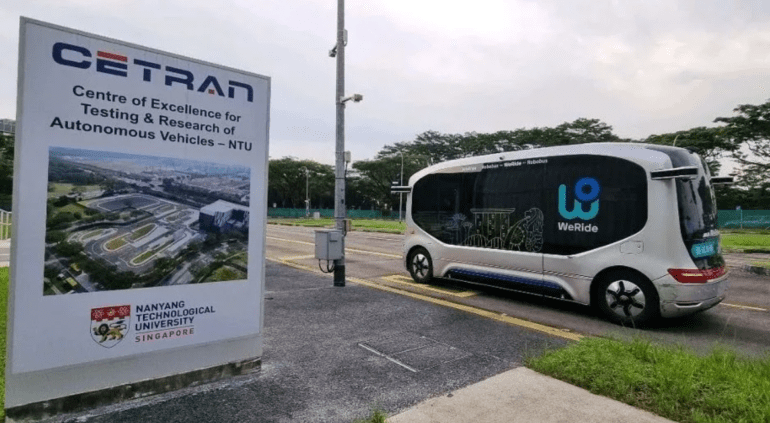TL;DR:
- WeRide, a Chinese autonomous vehicle company, has secured licenses (M1 and T1) from Singapore’s Land Transport Authority (LTA) to test autonomous buses on public roads.
- This expansion came shortly after WeRide obtained a self-driving license in the United Arab Emirates and held various AV permits in the U.S. and China.
- WeRide’s strategic shift focuses on autonomous buses operating at lower speeds and fixed routes, aligning with commercialization efforts.
- Singapore has been gradually entering the second phase of autonomous vehicle development, attracting global players like WeRide.
- WeRide’s preparations for the international market include strong investor backing and strategic partnerships.
- Singapore’s Prime Minister’s ride in a WeRide robotaxi highlights the company’s significance in the Singaporean market.
- WeRide’s valuation of $4.4 billion and confidential U.S. IPO filing signify its strong global growth potential.
Main AI News:
China’s autonomous vehicle pioneers are eyeing international markets after years of domestic expansion. WeRide, in particular, has been actively pursuing licenses to solidify its presence on the global stage.
In a recent development, WeRide proudly announced its acquisition of two licenses, known as M1 and T1, from Singapore’s Land Transport Authority (LTA). These permits enable WeRide’s autonomous buses, often referred to as “robobuses,” to conduct large-scale testing on public roads. The testing areas include prominent locations such as the One North tech cluster and the National University of Singapore.
This strategic move comes only five months after WeRide secured a self-driving license to test its robotaxis on open roads in the United Arab Emirates, a nation with ambitious plans for automating its transportation system. Furthermore, WeRide holds various levels of autonomous vehicle permits in the United States and its home country, China.
In recent years, China’s autonomous vehicle companies have shifted their focus towards commercialization, redirecting their efforts from the resource-intensive pursuit of Level 4 robotaxis. For instance, WeRide has been investing in autonomous buses, which operate at lower speeds, follow fixed routes, and navigate through less unpredictable traffic conditions. This strategic pivot aligns with WeRide’s commitment to providing efficient and reliable autonomous transport solutions.
Singapore, known for its dense population and aging workforce, embarked on its journey into autonomous vehicles back in 2014 to address land and manpower constraints. The Land Transport Authority (LTA) has adopted a measured approach, beginning with the first phase of “test beds” in controlled environments. Now, Singapore is poised to enter the second phase, allowing autonomous vehicles for both passengers and utilities to operate in selected areas. This progressive stance has attracted global players in the self-driving sector, including Motional, a joint venture between Aptiv and Hyundai, which has been actively testing robotaxis in the city.
WeRide’s successful acquisition of licenses reflects the culmination of months, if not years, of building relationships with regulators and business partners in the foreign market. Notably, WeRide has garnered support from a robust list of investors, including SMRT, a major public transport operator in Singapore, and local investment firm K3 Ventures.
On the business front, WeRide has solidified strategic partnerships with prominent players such as Woodlands Transport Services, one of Singapore’s largest private transport operators, and bus service company EZ Buzz. These collaborations are integral to WeRide’s mission to establish a strong foothold in the Singaporean market.
WeRide has emerged as a prominent figure among Chinese tech companies, expanding their presence in Singapore, even capturing the attention of high-profile political figures. In March, Singapore’s Prime Minister, Lee Hsien Loong, took a ride in a WeRide robotaxi during his visit to China, highlighting the company’s significance in Singapore’s journey towards autonomous mobility. Tony Han, WeRide’s founder and CEO, emphasized Singapore as a “regional center” for the company’s Asia-Pacific market expansion during Prime Minister Lee’s visit.
With a valuation of $4.4 billion last year and a confidential filing for a U.S. IPO in March, WeRide stands as one of China’s most well-funded autonomous vehicle companies, poised for further global growth and innovation.
Conclusion:
WeRide’s expansion into Singapore and its focus on autonomous buses reflect a strategic shift towards commercialization and diversification. This move, along with strong investor support and partnerships, positions WeRide as a significant player in the global autonomous vehicle market. As Singapore continues to develop its autonomous vehicle ecosystem, it attracts innovative companies like WeRide, indicating a promising market for autonomous transportation solutions in the region.

